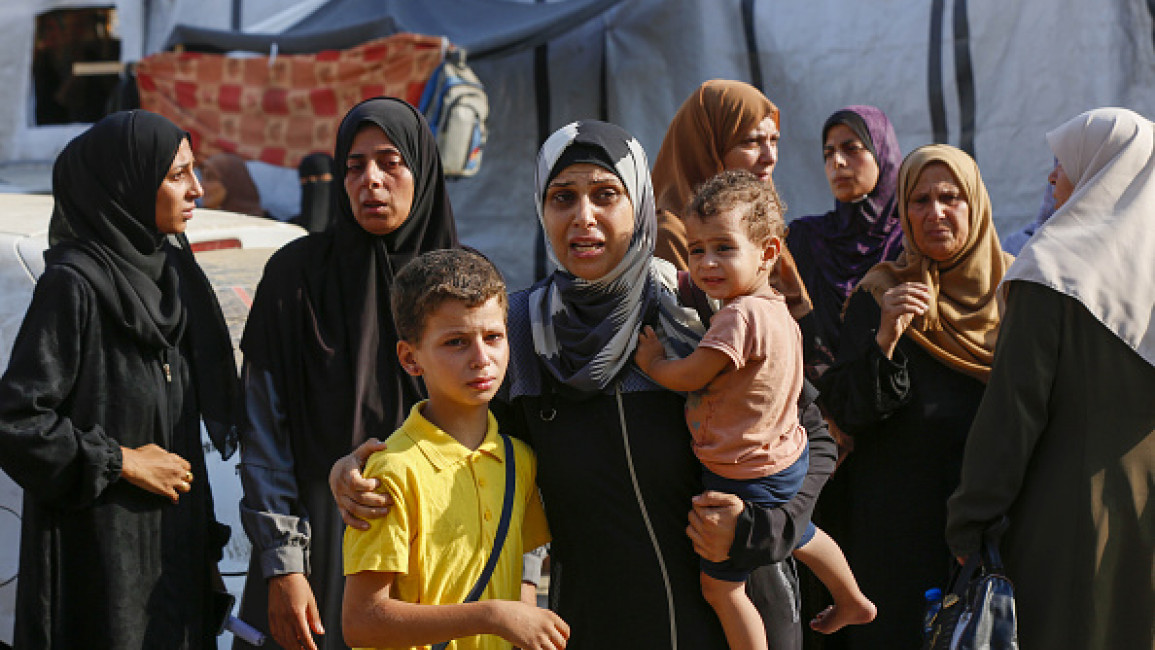Death 'the only certainty' for Gazans, says UN official
In war-ravaged Gaza, death appears to be the "only certainty" for 2.4 million Palestinians with no way to escape Israel's relentless bombardment, a UN official said Tuesday, recounting the growing desperation across the territory.
"It does feel like people are waiting for death. Death seems to be the only certainty in this situation," Louise Wateridge, a spokeswoman for the UN agency for Palestinian refugees, also known as UNRWA, told AFP from Gaza.
For the past two weeks, Wateridge has been in the Gaza Strip, witnessing the humanitarian crisis, fear of death and spread of disease as the war rages on.
"Nowhere in the Gaza Strip is safe, absolutely nowhere is safe. It's absolutely devastating," Wateridge said from the Nuseirat area of central Gaza -- a regular target of Israel's aerial assaults.
Since fighting broke out in October, Israeli forces have pounded the besieged territory from the air, land and sea, reducing much of it to rubble.
Now in its eleventh month, the war has created an acute humanitarian crisis, with hundreds of thousands of people, most of whom have been displaced several times, running out of basic food and clean drinking water.
"We are facing unprecedented challenges when it comes to the spread of disease, when it comes to hygiene. Part of this is because of the Israeli imposed siege on the Gaza Strip," Wateridge said.
Israel's war on the Palestinian enclave has killed at least 40,173 people, with most of the dead in Gaza are women and children, according to the UN human rights office.
Rats, mice, scorpions
Tens of thousands of people have taken refuge in schools across the Gaza Strip, an increasingly regular target of Israeli missiles.
"Even a school is not anymore a safe place," said Wateridge.
"It feels like you're never more than a few blocks away from the front line now."
Tired of reacting to the Israeli military's "continuous" evacuation orders, more and more Gazans are reluctant to keep moving from place to place, Wateridge said.
"They feel like they're being chased around in circles... It's quite a lot to move in terms of the heat, young children, elderly, disabled," she said.
Many Gazans AFP has interviewed say they no longer want to move their families, their tents and the few belongings they are still left with.
They have criticised what they describe as a lack of clarity in Israeli evacuation orders -- including maps dropped from planes -- and communications challenges given Gaza's lack of regular internet access, electricity and telecommunications coverage.
Those who are still moving say that wherever they go "there are rats, there are mice, there are scorpions, there are cockroaches," Wateridge said, adding that insects "spread disease from shelter to shelter."
Last week the Gaza health ministry said the territory had recorded its first polio case in 25 years.
Wateridge said that the UN was waiting for Israel's green light to go from tent to tent and vaccinate children to prevent polio from spreading.
Though talks have been deadlocked for months, Wateridge said Gazans "always hope for a ceasefire" and "keep a close eye on the negotiations".
In the coming days, international mediators the United States, Qatar and Egypt will hold a new round of talks in Cairo to again try to secure a ceasefire deal between Israel and Hamas.




 Follow the Middle East's top stories in English at The New Arab on Google News
Follow the Middle East's top stories in English at The New Arab on Google News
![The US vetoed a UN Security Council (UNSC) resolution demanding a ceasefire in Gaza [Getty]](/sites/default/files/styles/image_330x185/public/2185152251.jpeg?h=7ef8ac04&itok=RpLSj2pu)

![An attack by paramilitary forces in Sudan has killed at least 40 people [Getty]](/sites/default/files/styles/image_330x185/public/2182364341.jpeg?h=a5f2f23a&itok=r8Fkhxdj)